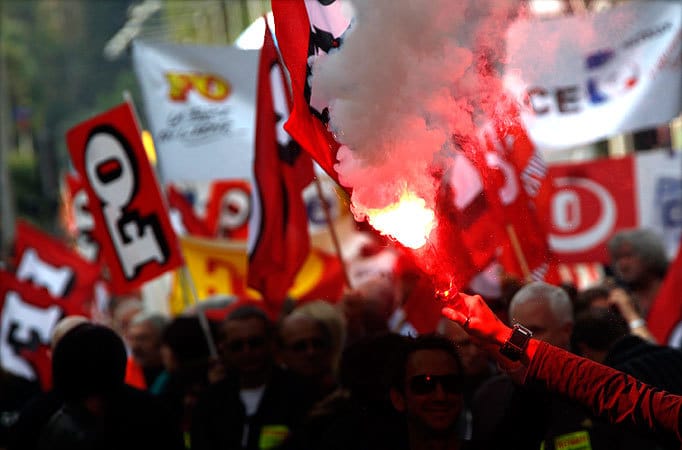Were the French right to strike?
During October 3.5 million French workers took to the streets to protest against changes to pension plans

Samuel Furse
Yawn yawn, the French are on strike again, and I and others are left wondering what the point is. This time at least, it appears to be some sort of principle, though whether this raises them above the level of London Underground tube drivers striking is questionable. The majority of the people they inconvenience either earn half what they do, or work for twice as many hours in a day – generally both.
However, I cannot help but think the strikers in France have got it wrong too, and for several reasons. For one, several affluent Frenchmen (and women) known to me have described the French predilection for striking as the ‘national sport’. This hardly imbues it with a moral worthiness the strikers might wish for. But even more than that, the principle, which it doubtless is, over which they are striking now is seemingly impossible to rationalise. They do not like the age of compulsory retirement being raised from 60 to 62 years. This seems rather spoilt when one considers that in both the UK and in Germany, the age of compulsory retirement is 65, and will rise in both countries, probably to 67 or 68.
There is little resistance to this in Britain, one imagines for a variety of reasons. No one has any money and so it is understood that we all need to work for longer. What many may not have considered is the fact that when the current system of state pensions was designed, the expectation was a retirement of only a few years after the age of 65. The fiscal comparison of this with today’s retirements of twenty or even thirty years, has not been widely reported. Perhaps more importantly, a compulsory retirement of almost any age seems a form of ageism. Whole sitcoms have been written about the subject (Waiting for God; The Legacy of Reggie Perrin), in which experienced, well-trained personnel at the top of their games are ‘retired’. They call it being ‘thrown on the scrapheap’.
Second, striking does not seem to fit with the principles it means to in France. This rather French off-centre attitude goes back a long way—the first clear example being that beheading the aristocracy was as recondite to egalitarianism as any of the current activity is. Mme. Guillotine did nothing to equalise people. If anything she served to mark the unsatisfactory delineation as clearly in death as it was in life.
The British have an innate distrust of their politicians, the French seem to have an innate belief that theirs are criminal. Many turn out to be so, but that does not seem to make the French electorate change that. So instead of complaining-by-inconveniencing, what about making a rational analysis of the effect on the lives of everyone?
Charles Betts
Ever since the 14th July 1789, the French have consistently displayed a fair amount of je ne sais quoi when it comes to acts of rebellion. The Storming of the Bastille cemented France’s reputation, in the words of François Mignet, as a nation “intoxicated with liberty and enthusiasm.”
Closer to most French hearts, however, are the riots of May 1968. What started as a piddling group of grumbling students soon exceeded 20,000 people. Within less than a week, over a million people were marching through Paris in their support. You blinked your eyelids and the number had become ten million! President Charles de Gaulle fled the country, calling for new parliamentary elections to calm the rising violence and avoid civil war. A bunch of adolescents had very nearly caused the collapse of the government. And none of this had been driven by the unions.
Ever since 1968, France has become a more liberal place, with less respect for authority and a steadfast desire to place quality of life at the centre of all social reform. In 1983, President François Mitterrand brought in the right to retire at 60, and in 2000 Prime Minister Lionel Jospin helped instigate the 35-hour working week. But this social trend is under threat from a bill to make people work two more years for their pensions. A bill that is being rushed through the upper house using a highly contentious emergency constitutional measure.
The public are out in force once again, living up to their strong striking and demonstrating pedigree. Current President Nicolas Sarkozy is in essence a wannabe JFK, and likes to portray a Hollywood persona. He is the least popular leader in the history of the Fifth Republic, and is at odds with two-thirds of the French citizens that he represents who oppose the pension law. He has been accused of ignoring the public and comes across as a tetchy authoritarian, arrogant president. How their French howls of protest put to shame our British whimpers against the draconian cuts we are facing.
The French government seems to only listen to public opinion when under serious pressure to do so. It’s almost as if the whole political system is centered on striking. The government appears to deliberately wait for a strike before considering any negotiations, whatever the issue. The people are correct to express their democratic right to strike, regardless of the financial impact of the reforms. They adamantly believe in a social way of life that has taken countless battles, fought by their parents and grand-parents, to achieve. They are being true to their principles and culture, putting us don’t-you-mind-if-you-don’t Brits to shame.









